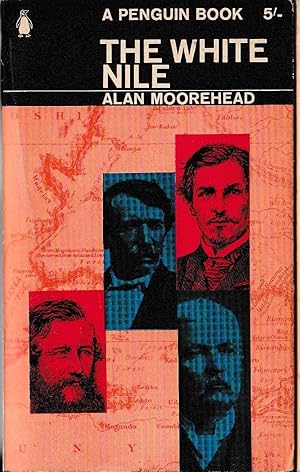
Historical narrative of Western exploration of Central Africa and search for source water of the Nile. This is the Revised Edition of 1971 in which text has been slightly shorted to include 48 color plates and 120 monochrome illustration. Label remanets to fEP, and PO embossed stamp to first title page. DJ/Good sound w/edge rubs, short closed tears & losses to upper edges. Illustrated taupe boards/NF w/trace edge rubs. First Edition Thus (1963), not directly stated, but implied by lack of subsequent printings cited in accordance with Penguin Books's customary practice at the time of publication.


NOT a Remainder, Book-Club, or Ex-Library. A sturdy copy, structurally sound and tightly bound. Free of underlining, hi-lighting, notations, or marginalia. Free of creased or dog-eared pages in the text. Good+ in Wraps: shows indications of moderate use: a former owner's address label at the upper corner of the front endpaper considerable spine lean light wear to the extremities mild rubbing to the wrapper covers foxing to the bottom edge of the text pages a crease at the lower rear corner and some creasing to the backstrip. Explorers of the Nile would have been a better book without that last chapter, but it remains a masterful account of one of the most exciting periods of exploration.Mass Market Paperback. The coverage is too brief, making the conclusions seem unjustified. Also less successful is Jeal's concluding chapter, which considers the consequences of exploration, from the Belgian colonisation of the Congo to the Khartoum government's recent attack on Darfur. Elsewhere, it is suggested that the earlier traveller Mungo Park was speared to death, but in fact he drowned in the Niger.

The book opens – the second sentence – with a false assertion: Alexander the Great never visited the Temple of Amun in Luxor, instead going to the Temple of Ammon in Siwa. He also brings into focus the people who made the whole thing possible, the guides and porters to whom none of this was a mystery and who have, traditionally, been written out of such accounts.įor all his scholarship, there are still mistakes. This new material shows Speke to be a much rounder and more sympathetic character, just as Jeal's earlier book showed Stanley to be less of a brute than previously assumed. And he has managed to dig up some new material, including the original manuscript of Burton's travelling companion, Speke. He has a sure grasp of the range of characters, of the terrain they crossed and of the issues of the time. Jeal approaches this rich material having already won awards for his biography of Stanley and he tells this bigger story well enough for his volume to replace Moorehead's duet.


 0 kommentar(er)
0 kommentar(er)
